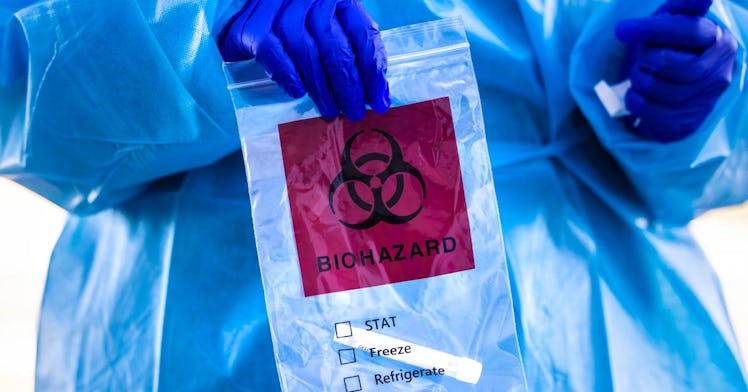What We Know About the Now Widespread COVID Variants — And What You Can Do
The variant from the UK could be 30 percent more lethal than the original virus. Vaccines are less effective against the one from South Africa. Here's what you can do.

Three major coronavirus variants are circling the globe, and they’re probably more transmissible than the original virus. They are the coronavirus variant originating in the UK that is also known as B.1.1.7, a coronavirus variant originating in South Africa, and a variant originating in Brazil. The good news is that at this point in the pandemic, public health officials know how to keep these viruses at bay: With masks and social distancing. The bad news — and there’s more bad than good here — is that they are likely more transmissible, possibly more deadly, potentially already widespread in the US, and there’s new evidence that the current vaccines might not be as effective for all the variants. Here’s what we know.
B.1.1.7, the Coronavirus Variant Originating in the UK
The most widespread example is the so-called UK variant, and new data suggests it’s probably more deadly too.
The variant that originated in the UK, officially called variant B.1.1.7., is 30 to 70 percent more transmissible than the original coronavirus, according to the country’s chief scientific adviser Patrick Vallance. Emerging data hints that it may be 30 percent more deadly too. For men in their 60s who picked up the original virus, “the average risk is that for 1,000 people who got infected, roughly 10 would be expected to unfortunately die,” Vallance says. “With the new variant, for 1,000 people infected, roughly 13 or 14 people might be expected to die.” In other age groups, the increased risk of death is similar.
Still, the early evidence supporting these statistics isn’t the last word on the matter. The leading COVID-19 scientist at the World Health Organization said they haven’t seen an increased severity in cases from the UK variant, according to the Associated Press. Early studies on the strain did not find an increase in mortality connected to it, but more recent ones have pointed to deadlier disease. It’s difficult to tease apart whether the strain itself is causing more deaths or whether the death rate is higher because of other factors, such as hospitals being overrun.
Some top COVID-19 scientists in the US are convinced by the available evidence. “The data is mounting — and some of it I can’t share — that clearly supports that B.1.1.7 is causing more severe illness and increased death,” Michael Osterholm, a member of President Joe Biden’s COVID-19 transition team and director of the Center for Infectious Disease Research and Policy at the University of Minnesota, told CNN. “Already we know this variant has increased transmission, and so this is more very bad news.”
B.1.1.7 has reached dozens of countries and 28 US states, according to a map from the Centers for Disease Control and Prevention. More than 300 cases have been logged in the country, and they’re almost certainly undercounted. This variant is expected to be the most common strain in the states by March. Luckily, both the Moderna and Pfizer vaccines appear to be effective against it.
The Coronavirus Variant Originating in South Africa
Other variants are not nearly as widespread as the UK version, but they are in some ways raising more alarms across the world. The lineage that originated in South Africa is about 50 percent more transmissible. There is no evidence that it causes more severe disease than the original, but it may have a greater effect on young people. It has made its way to more than two dozen countries and has been detected in at least two cases in the US Both cases, found in South Carolina, point to this variant being more widespread than previously thought since there was no overlap in the spread of the cases (they were entirely independent, sharing no contacts) and neither infected person had traveled in recent months.
Furthermore, a recent trial conducted with Johnson & Johnson’s vaccine in South Africa showed significantly lower efficacy — 72 percent in the US but 57 percent in South Africa, where the variant is most prevalent. The good news is that at 57 percent, vaccines do still seem to offer some protection. And the vaccine was 85 percent effective at preventing severe disease against all major variants. Vaccine manufacturers are already making booster shots that specifically target this strain.
The Coronavirus Variant Originating in Brazil
The other variant that is on the radar of public health officials has been ravaging Brazil since as far back as July. It recently made its way to the US; Minnesota reported one case in a person with recent travel history to the country. The Brazil variant is probably more transmissible, but what makes it particularly scary is that some evidence suggests it can evade antibodies, which may give it the power of reinfection. This “immune escape” could allow the variant to get past antibodies created by the COVID-19 vaccine. Experts suspect that the vaccine will grant similar levels of protection against the Brazil variant as the South Africa variant — but many a watchful public health expert are keeping close eyes on this variant.
What to Do About COVID-19 Variants
There are a lot of unknowns as to how far the variants will spread and how effective vaccines will be against them. So what can the general population do? Social distancing and masks continue to be the most effective way for the US population to fight the spread of coronavirus and its now-many variants.
This article was originally published on